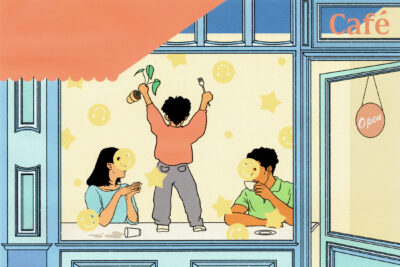 My friend Hannah, a single mother of two boys, ages 6 and 9, remembers the first time a teacher brought up her older son’s behavior at school. She had left New York City in the midst of his public-school kindergarten year to temporarily hunker down near family during the pandemic. A few months later, she enrolled him in an in-person private school near where they’d relocated. At an introductory play date there, a teacher, who had been at the school for 40 years, “very nicely said to me, ‘This is a young gentleman who needs to learn some boundaries.’” Now settled back in Manhattan, Hannah recently received a similar note about her younger son, who is in kindergarten. “I met with the school psychologist because I had noticed a lot of disrespect at home,” she said. The psychologist said the same thing as the small-town kindergarten teacher: The kid needed boundaries.
My friend Hannah, a single mother of two boys, ages 6 and 9, remembers the first time a teacher brought up her older son’s behavior at school. She had left New York City in the midst of his public-school kindergarten year to temporarily hunker down near family during the pandemic. A few months later, she enrolled him in an in-person private school near where they’d relocated. At an introductory play date there, a teacher, who had been at the school for 40 years, “very nicely said to me, ‘This is a young gentleman who needs to learn some boundaries.’” Now settled back in Manhattan, Hannah recently received a similar note about her younger son, who is in kindergarten. “I met with the school psychologist because I had noticed a lot of disrespect at home,” she said. The psychologist said the same thing as the small-town kindergarten teacher: The kid needed boundaries.
Hannah readily admits that she might be a tad permissive as a parent. She has a hard time holding the line with screen time on school nights and gives in to stop the mind-numbing negotiating her kids have perfected. On a recent visit to a friend’s house, where her kids didn’t want to eat the breakfast that was offered, Hannah marveled as the dad of the house told them there were no other options and they could take it or leave it. “I thought, We can do that?” Hannah laughed. “I am making toast and sausage for one kid, eggs for another, running around.”
She doesn’t name her philosophy as “gentle parenting” or “respectful parenting” or “intentional parenting” — though she’s familiar with these buzzwords. They cloud the air that modern parents, myself included, breathe. Instead, she says she is simply trying to be less punitive than her own parents, to break up the patterns (namely, screaming and spanking) that she and many of her fellow Gen-X parents experienced growing up. According to a new, still unpublished study, this is exactly how parents of young children who are attempting to practice gentle parenting see the movement. Researchers Alice Davidson, Ph.D., a professor of developmental psychology at Rollins College in Winter Park, Florida, and Annie Pezalla, Ph.D., an assistant professor of psychology at Macalester College in St. Paul, Minnesota, asked 100 parents to choose adjectives that describe their own parenting style versus their parents’. “Those who identified as ‘gentle parenting’ parents used more terms to describe their approach: gentle, affectionate, conscious, intentional. All the words are synonymous,” says Davidson. “Whereas they use fewer, more simplistic words to describe their parents,” she says — words like reactive or confrontational. “Even for respondents whose parents showed a lot of love and warmth, they want to do that and then some,” says Davidson.
This softer approach, however, doesn’t necessarily get results. When Hannah’s kids misbehave, she finds that talking about what they’re feeling or taking a few deep breaths in the other room doesn’t seem to help. And while she is convinced that her kids don’t “walk all over” her, she knows she isn’t consistent with expectations and limits. She is getting tired of the escalating back talk, throwing, and ruthless negotiating. She tells me she wonders if she’s been too soft. No one wants to usher in a generation of entitled jerks. But are well-meaning gentle parents doing just that?
“Jerk” sounds harsh. (Dr. Becky Kennedy, one of Instagram’s most popular parenting experts and the author of a best-selling book, Good Inside, calls these children “good kids who are having a hard time.”) But if you are a parent, you’ve seen the hard time up close, possibly in your own house. Kids on playdates who throw the applesauce pouch across the room after demanding graham crackers. Kids who hit with no punishment. Kids who act as if there are no rules, only suggestions.
“I had a second-grader and her mother over to play, and at one point, the child slapped her mother because she didn’t get something she wanted. And the mother did nothing! She didn’t even seem embarrassed!” says Elsie, a mother of three in Harlem, who says her own parenting style leans more traditional, with a big emphasis on respecting adults. Jill, a public-school teacher in Harlem and private tutor throughout Manhattan, says she frequently deals with kids in her tutoring sessions who seem to have the upper hand over their parents. “Kids refuse to participate in a tutoring session, they pull out their iPads, one locked himself in the bathroom,” she says. “That’s typical of kids. It’s the reaction of the parents that’s telling. They just throw up their hands.”
No expert promoting gentle or respectful parenting would condone a kid slapping her mother. None of the books tell parents to abdicate the household throne to their toddler or let every tantrum slide. The problem, however, is that it’s not straightforward to describe or explain what gentle parenting says these parents should do instead. “Parents who identified as gentle in our study usually note three things: They regulate their own emotions in the middle of a conflict and try to name their child’s emotions (‘You look angry. Do you feel angry?’), they try to give the child coping skills, like sitting with their feelings, and they give affection,” says Pezalla. “There is a lot of hugging it out. When we asked about a time their children misbehaved and how they handled it, many parents said, ‘I asked my child if they needed a hug.’”
From my experience with gentle-parenting content — on Instagram, which is fertile ground for this stuff — these tenets sound right. There is copious listening, helping kids process their emotions, and remaining firm and calm in the face of chaos, abstaining from knee-jerk punishments or rewards to coerce good behavior. Davidson and Pezalla say it’s a philosophy that grew out of the primordial goo of attachment parenting but does not have roots in academic scholarship or study. “There has been so much evidence that documents the importance of not dismissing big feelings, of validating emotions,” says Davidson. “My concern is that people going deep on gentle parenting are going too far. Do we have to indulge every last emotional experience? Sometimes you have to move on.” Davidson and Pezalla found that of the parents in their study who adhered to gentle-parenting principles, 40 percent said they actually didn’t know what they were doing. Many said they felt “exhausted,” “overstimulated,” and “hanging on for dear life.”
Frankly, those words could describe any parent at various points in the day, regardless of your approach to raising kids. Parenting is, on the sunniest days, complicated and time-consuming. But to me, the gentle-parenting movement has taken a valid idea — respecting our children’s emotions — and pushed it to the point where the power dynamic is flipped, and kids are running the show. Pezalla and Davidson agree. “It’s as if there is a democratic approach to parenting. Parent and child are on the same level, and in some cases, the child is above the parent,” says Pezalla. In the process of evolving away from traditional discipline and toward gentler strategies that might not be instinctive, many of us have ended up in a weird place.
My concern is that people going deep on gentle parenting are going too far. Do we have to indulge every last emotional experience? Sometimes you have to move on.— Dr. Alice Davidson
I live on the Upper West Side, but I grew up in the Deep South and addressed most adults with “Ma’am” or “Sir” well into my 20s. So I care a lot about respect and manners and tend to be on the stern side with my three kids. I’ve threatened to wash mouths out with soap, like my own mother did. I’m certain I’ve said, “Children should be seen and not heard” only half-sarcastically in the past six months. (Somewhere, a gentle parent just lost her wings.) Still, I long to be a little more of an empathetic guide and less of a ranting dictator.
Like many parents, I was introduced to parenting coaches and Instagram gurus during the pandemic, when life at home felt so untenable with small children. This is when the gentle-parenting wave really began to roll; again, it has gained traction not through research but through TikTok and Reels. But as I watch gentle-parenting advocates post videos on Instagram and try to remember Dr. Becky’s wise scripts when my 5-year-old is thrashing naked on the floor instead of walking out the door to school, I wonder, Am I being indulgent? Am I focusing too much on my kids’ feelings at the expense of my own? Or the rest of the family? And most importantly: As I decide what to do, am I thinking about an Instagram graphic I read or listening to my gut? Social media has given parents an alternative to their instincts.
If a kid is screaming for a third cookie, and a parent is trying to avoid a response like, “You won’t ever get dessert acting like that,” or “Eat another bite of broccoli, and then we’ll see,” the other choices are these: Give the kid the cookie to make the screaming stop (not great) or explain that you’ve already discussed the rules about dessert beforehand (because that’s what gentle parents do, obviously) and affirm your child’s disappointment while holding the line, even as the storm rages for minutes or even hours. Meanwhile, good luck having a much-needed conversation with your spouse who you haven’t seen all day or making a phone call. I’d hand over the cookie for peace. Or maybe yell, “Stop crying, or I’m canceling Christmas,” but that’s just me. Of course, I’d pay the price; it is harder to hold the line later on when you’ve caved. The gentle way is better, but very, very hard. It’s no wonder parents often choose the “easy” out — and unintentionally indulge their kids.
Kathleen, a mother of two teens and a first-grade teacher at a private school in Manhattan, affirms that the pandemic ushered in an era of parents bending and twisting to their children’s desires in new ways. “There has been a significant shift. It’s as if parents feel their children missed out on something” and now want life to always feel special, with no disappointments, she says. Kathleen hasn’t noticed an uptick in overly disruptive behavior, but more of a “It’s my world, and everyone should revolve around me” mentality. Where she used to see kids rolling with a paper cut, lately they need a Band-Aid “now!” Kids refuse to carry their backpacks, and parents are more than happy to oblige them. “Kids are less resilient. They don’t know how to compromise,” she tells me.
Manhattan mom Jennie Monness, a parent educator and founder of Union Square Play, posts videos and personal stories about navigating challenges with her children for her 91,000 Instagram followers. In her videos with her two young daughters, Monness embodies the calm, respectful parenting model. But scrolling her feed, I notice that mixed in with the “YES. THIS” comments about, say, having natural consequences instead of using time-outs, a few parents are asking something along the lines of, “Sounds good, but what are the natural consequences for biting a sibling?” or “Yeah, what if the natural consequences are that I’m late for work and miss an important meeting?”
On the @biglittlefeelings feed, the Instagram account run by Kristin Gallant, a parent coach, and Deena Margolin, a child therapist, which has more than 3 million followers, some recent posts read, “Stop Telling Your Kid to Go Say Sorry,” and “Why We Shouldn’t Try to Stop Our Kids’ Crying,” both of which are, of course, styled to get eyeballs but also follow familiar scripts of respectful parenting. Like Monness’s followers, most commenters are enthusiastic and grateful for the guidance. But there are also those who struggle to implement the strategies in real life and have questions: “What if they are throwing themselves all over the place?” “What if they’re also screaming at me?” “Aren’t we raising self-absorbed kids?” One commenter on the apology post wrote, “If another child hurt mine and didn’t apologize, and the parent didn’t ask them to, quite frankly, I’d be horrified, and my child would be confused.”
I bring up these accounts not to criticize what these influencers are doing — I think there is a place for Instagram experts to offer bite-size tips and encouragement to parents where they’re at (on their phones) — but rather to point out that gentle parenting, at its best, is complicated and hard to do well. And I haven’t even broached the fact that many experts say excavating your own childhood traumas and patterns is a requirement for the system to work. Being a respectful parent starts with therapy, it seems. I feel for my fellow parents who watch influencers’ beautifully curated videos of magical teaching moments and think, Oh my gosh, who has the time? And who silently, even guiltily, wonder, If I can’t do this gentle-parenting thing well, because I’m overwhelmed with multiple kids and a stressful job, is it better to keep trying and failing, or should I forget the whole thing and go with something like … time-outs?
“First of all, time-outs can be an effective approach when used correctly, and you can absolutely tell your kids to put on their shoes and get going in the morning!” says Rebecca Hershberg, Ph.D., a clinical psychologist in Dobbs Ferry and author of The Tantrum Survival Guide. Hershberg also posts parenting tips on Instagram, even ones that encourage parents to support their children’s feelings, but emphasizes a “love and limits” framework focused on what she describes as high levels of warmth and high levels of boundaries. “I don’t think anyone is in favor of disrespectful parenting. But there is a lot of misunderstanding of what gentle parenting is,” she says.
I asked Hershberg, “Why is gentle parenting so hard for parents, and why does it often turn into being too permissive and indulgent? Are we afraid of doing it wrong, so we end up doing nothing? Are we too overwhelmed and exhausted to talk through our toddlers’ feelings yet again before breakfast?” The answer is yes — to all of it, she says. “What is most exhausting for parents is thinking there’s an exact way to do things and a wrong way to do things and walking around with the pressure that you’re going to ruin your kids because you used a sticker chart,” she says. Davidson and Pezalla point out that our generation of parents are starting from an earnest place but are intent on going above and beyond — and we are killing ourselves to curate the perfect parenting philosophy, even though that doesn’t really exist.
In other words, the parents standing idly by and smiling while their child hurls toys against the wall aren’t checked out or uninformed; they may be the opposite — oversaturated. And if their well-meaning, gentle-parenting tactics have left them with a tiny despot, have some compassion. Those parents may be suffering the most. They are trying to raise children amid confusing messages, and it’s maybe not going so well. Their children are acting like rabid squirrels, which is annoying at a birthday party, but think of it this way: They have to live in the same house as said squirrels. And maybe they don’t have a single second (let alone a spare three hours) to talk through a child’s feelings or reexamine the missteps of their own upbringing because they are caring for an aging parent or doing their taxes or filling out school forms. Every parent deserves a little grace. It’s hard, thankless work to parent with proper love and limits. It’s equally hard to think you’re doing right by your kid only to get slapped in the face on a play date.
“All of type-A, New York City parents would love to think they’ve figured out the best way to parent,” says Hershberg. That goes for hard-core gentle proponents, traditionalists, and hybrids in the middle. “It’s harder to accept that it’s complicated.”
Original article here






















Sorry, the comment form is closed at this time.